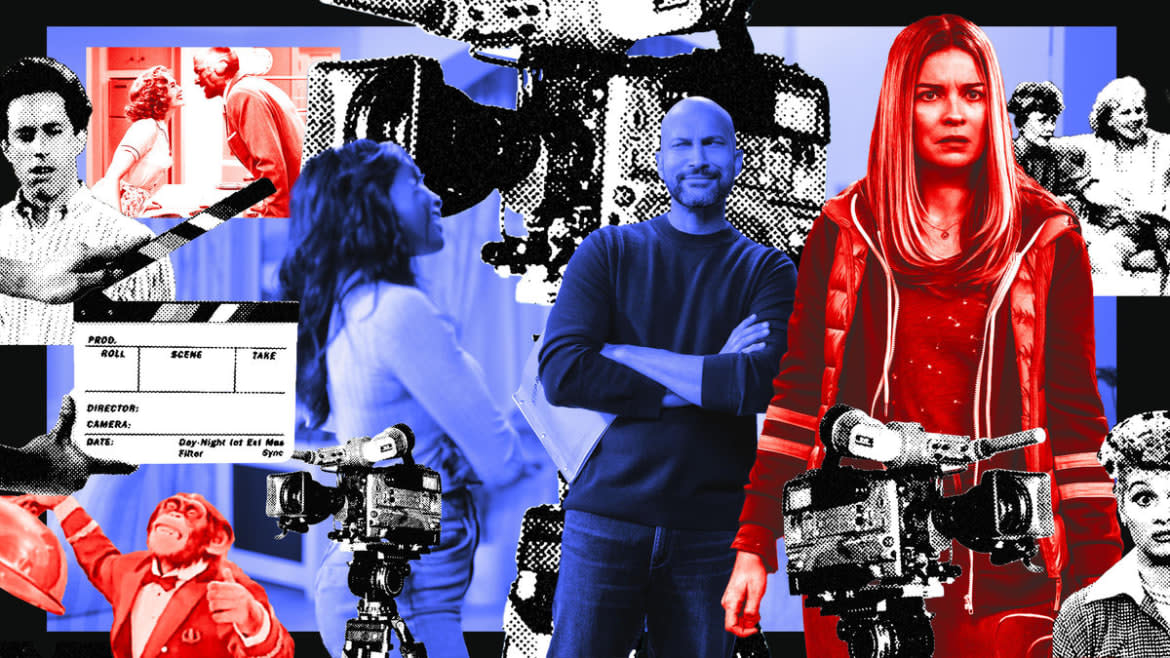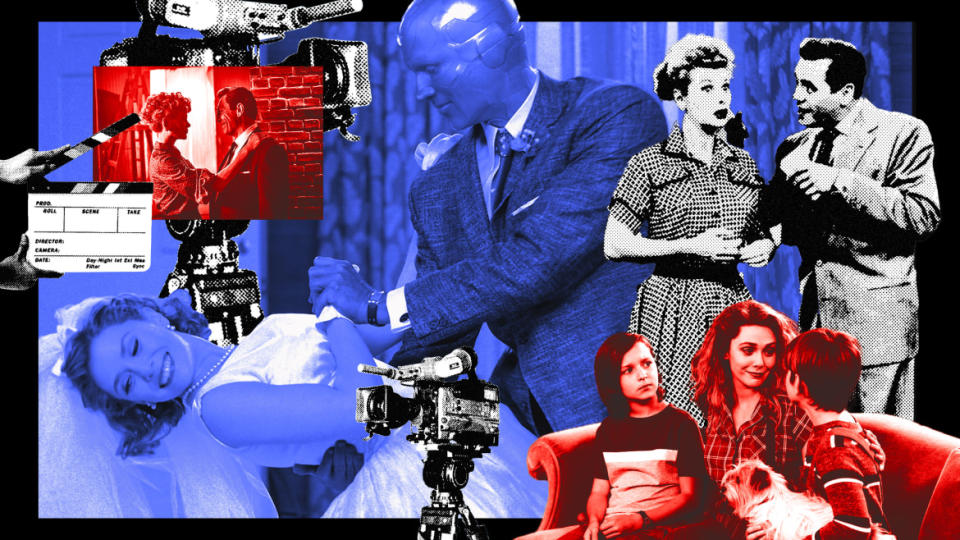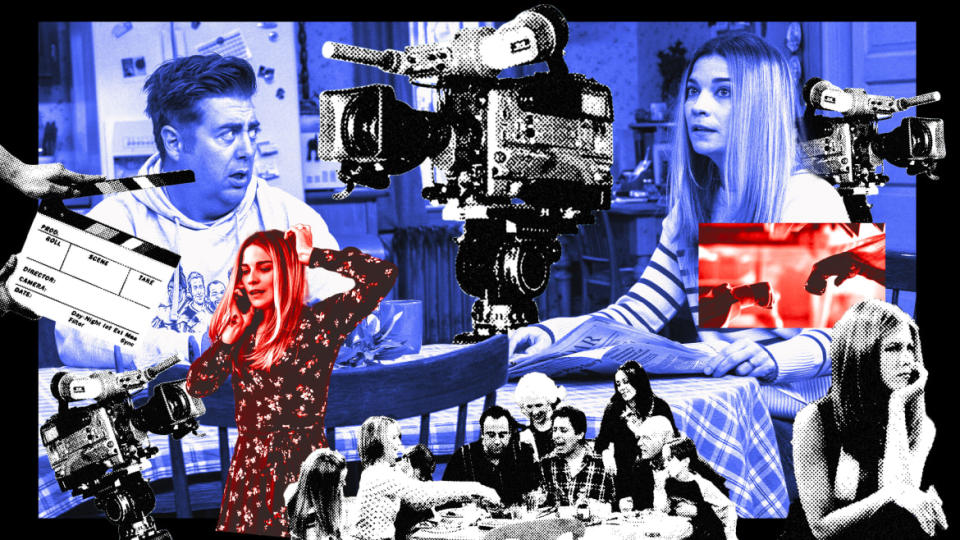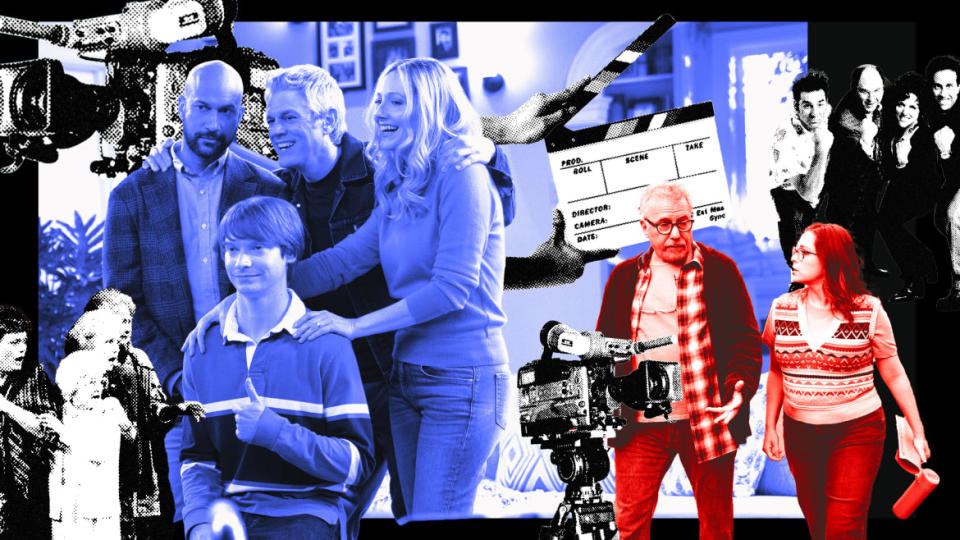The Classic Sitcom Is More Popular Than Ever (Even Though No One Makes Them Anymore)

- Oops!Something went wrong.Please try again later.
- Oops!Something went wrong.Please try again later.
When Abbott Elementary recently won two Emmys Awards, it proved successful network sitcoms aren’t on the extinct list. Quinta Brunson’s series embraces the 22-minute structure, doesn’t require signing up to yet another streamer, and is laugh-out-loud funny. (Some other titles in the Outstanding Comedy line-up, like the brilliant but bleak Barry, did not get the “jokes” memo.)
Abbot Elementary isn’t alone in current network sitcoms worth checking out (see also CBS’s Ghosts). Still, Too-Much-TV has replaced the Must-See glory days, and one previous titan of the genre that has been put out to pasture is the multicam. I still haven’t forgotten Netflix’s infuriating decision to ditch the actually good One Day at a Time remake, a choice that sounded the death knell for a format going strong since I Love Lucy made its debut in 1951. Yes, Pop TV temporarily resurrected the family comedy, but the pandemic impacted this last-gasp season before getting canceled one last time.
Outside of talk shows, shooting in front of a live audience (or adding a laugh track) has mostly fallen out of favor, but there has been a noticeable uptick in exploring this network television staple. Streaming services seem to have no interest in the passé art of the multi-cam, and yet they also seem to be obsessed with them. (And I’m not just talking about watching old episodes of Friends for the umpteenth time.).
Hulu’s Reboot has entered the meta-sitcom chat with a TV industry skewing (and celebrating) story focusing on a fictitious 2000s family-friendly comedy series called Step Right Up. It’s a show in which the premise hinges on Hollywood understanding why rebooting those nostalgic Everybody Loves Raymond-style sitcoms is, at this point, tired and a bad idea, but does it anyway. This town is built on fantasy, so perhaps there is a shred of belief that this one might somehow recapture the magic or surpasses the original—no matter how unlikely.
It examines what it was about the industry and our viewing habits that made, in hindsight, those kinds of “cheesy” series so popular, as well as what eventually put them out of favor. It also makes an argument for their continued value, asks what happens if we veer too far from the formula, and confronts why we would even want a multicam concept in the age of streaming. It turns out we do.
That case is not made so much by the show, but by our fascination, in the streaming age, with re-examining the popularity of these classic sitcoms—even as we run further away from the concept. (We have, by a rough count, three million new series and streaming services. So why are we all just watching The Golden Girls and Seinfeld?) It is the streaming equivalent of the guy looking back meme
In many ways, Reboot speaks to the death of the multicam, but also its immortality: Why we can’t get enough of watching old shows on streaming.
‘Reboot’ Is Hulu’s Hilariously Meta Take on a TV Trend That Won’t Die
Reboot joins the likes of WandaVision, Kevin Can F*** Himself, Nope, and Being the Ricardos in using the aesthetic of the practically obsolete format. No one wants to make a multicam comedy anymore, yet the familiar landscape continues to thrive beyond the old titles viewers turn to for comfort and nostalgia.
Last year, WandaVision sent me down the sitcom rabbit hole after I realized I only knew a lot of the references on a surface level. Whereas some viewers are looking for Marvel Easter eggs that tap into the larger MCU, the nods to television history led me on a deep dive into black-and-white pioneers like I Love Lucy and The Dick van Dyke Show.

Marvel has such a stronghold on the cultural conversation, so its choice to draw on sitcom touchstones like Bewitched, The Brady Bunch, and Full House stood out to this TV critic. Yes, I am also the person who, when Wong (Benedict Wong) was watching The Sopranos and This is Us in a recent episode of She-Hulk, wondered what conversations went into picking these specific shows (and getting the rights to play clips).
Disney+ kicking off its Marvel TV roster with Wanda’s sitcom-land sanctuary was an unexpected love letter to the evolution of the multicam through to the single-camera aesthetic that has since replaced it. The series only lost steam when the conceit was revealed to be a safe space based on Wanda’s childhood TV watching habits, and the final episode decided a sky battle is what we wanted. It was not.
‘Kevin Can F** k Himself,’ ‘WandaVision,’ and the Rise of the Ultra-Meta Sitcom
Sitcoms are structurally easy to emulate because they follow a similar framing in every episode—though it is an art to make a great sitcom. Something terrible happens, but not too awful, and by the end of the episode, the world has been put right. Audiences know this but play along with laughs, gasps, and cheers in the right places.
Of course, this wasn’t always the case, as Lucille Ball explains in her memoir Love, Lucy, about an episode in which Ricky (Desi Arnaz) moves out of the apartment. She describes the audience weeping at the too-close-to-reality series of events as the Arnaz marriage was famously tumultuous. Now they would be primed for the episode’s conclusion, but this audience had not got the everything-will-be-fine memo: “In what was supposed to be a hilarious scene, nobody laughed. They were too happy and relieved to see us together again.”
Off-screen tension fuels Aaron Sorkin’s hit-and-miss exploration of this foundational sitcom story in Being the Ricardos. Lucille Ball (Nicole Kidman) realizes her dream of a perfect marriage only exists on the Desilu soundstage she built with her husband. Here, the multicam takes on a different meta meaning in a biopic that shows the nuts and bolts but misses the heart.
It says a lot that Sorkin doesn’t think contemporary audiences would find I Love Lucy funny, a sentiment I can personally refute as I watched the series from start to finish for the first time last year. In fact, I am currently retreating into The Mary Tyler Moore Show amid the mountain of new TV I watch for work. Friends doesn’t have a spot on my rotation, as I watched it more than enough the first aired and on VHS. But I can understand why Gen Z are drawn to older material and why Netflix shelled out $100 million for a show that concluded in 2004.
Events in Central Perk are a security blanket; however, Wanda’s sitcom fairy tale conceit takes a sinister detour in AMC’s Kevin Can F*** Himself. In a sitcom wife-inspired fantasy early in the pilot, Allison (Annie Murphy) imagines herself wearing a Lucy Ricardo-leaning gingham frock contrasting with the sitcom she finds herself living.
For all the outdated gender conventions in I Love Lucy, it is still infinitely watchable because Ball is anything but the second fiddle. Rather than playing off two different sitcom styles of ’50s idealism with a two-dimensional sitcom wife role, Valerie Armstrong’s series juxtaposes a gritty filter with the bright palette and lighting of the familiar family sitcom that exists whenever Kevin (Eric Petersen) is on screen.
In its second and final season, Kevin’s bumbling and oafish behavior has given way to less subtle forms of abuse and coercion. Best friend Neil (Alex Bonifer) is no longer bound to the sitcom world after discovering Alison’s plan to kill her husband, and even he can barely hold the fixed smile when Kevin’s influence changes the setup. The real world might be more unpleasant, but the living room straight out of All in the Family is a prison rather than a Wanda-style sanctuary.
Why the F**k Aren’t You Watching ‘Kevin Can F**k Himself’?
Switching between a laugh track environment with bleak visuals is purposefully jarring and the underrated Kevin Can F*** Himself brings new meaning to the dramedy format. The facade of sitcom land is chipped away along with Allison’s will to live. Recent episodes have delved deeper into Allison’s psyche, proving this format is more than a gimmick. In “Ghost,” Allison’s mother gets the same bright color genre treatment as Kevin, and this technique emphasizes the people in her life that exert a level of control Allison cannot escape. In a genius piece of casting, Peri Gilpin (yes, Roz Doyle from Frasier) plays Allison’s overbearing mother, Donna.

Another casting coup was scoring Annie Murphy in her first post-Schitt’s Creek lead role. Allison is far removed from Alexis Rose in both the antihero emulating landscape and King of Queens style surroundings. Popular sitcoms no longer look like the latter and the cheesy multicam has been replaced by the likes of Schitt’s Creek. Nevertheless, there is an expectation that the Kevin Can F*** Himself audience will recognize the cheesy multicam and gritty tropes in its exploration of this abusive marriage at its heart. Of course, the tonal whiplash contributes to why this show is an underappreciated gem. It is an extended Twilight Zone scenario told through an extremely contemporary lens.
Nobody wields the sitcom-turned-nightmare scenario quite as effectively as Jordan Peele in Nope. The opening flash of a bloody chimpanzee wearing a party hat is a glimpse into the terror of what transpired on the set of Gordy’s Home when a balloon unexpectedly burst. Without delving too much into spoilers, this fictional family sitcom has strong Full House vibes that see a studio turn into a hunting ground. Opting to use this formulaic environment to draw a line from Hollywood to the unpredictability of nature emphasizes how multicam sitcoms are shorthand for stability and comfort.
Step Right Up follows a similar Full House pattern to Nope, but in Reboot, the only injuries are bruised egos. Netflix took on the Fuller House revival in a limp attempt to recapture the glory of this family sitcom fixture. It was more content with repeating old catchphrases than doing anything new. Millennial Hannah (Rachel Bloom) is best known for making an indie feature called Cunt Saw, so her pitch to make something “so traditional” is met with surprise by the Hulu executives (no fictional streamers here!). She plans to turn the family sitcom on its head by playing with the formula. “What the hell, let’s remake something original,” enthuses the executive, and Tinseltown is masterful at dishing out doublespeak.
Hannah has built a team in the writers’ room to reflect this goal, whereas co-showrunner (and original creator) Gordon (Paul Reiser, in brilliant casting) has turned to veterans of the field. It would be awfully tiring if this circled an endless “the woke versus inappropriate boomer” drain, but the back-and-forth isn’t stuck in this gear. Fred Melamed and Rose Abdoo continue their scene-stealing prowess (see their roles on Barry and Hacks), and Reboot’s familiarity with sitcom history adds to its effectiveness.

Nostalgia, as we know, is a valuable commodity: many reboots exist as a quick cash grab masquerading beneath a veneer of sentimentality. Reboot showrunner Steve Levitan is no stranger to this industry, having co-created Modern Family, the last network series to win Best Comedy at the Emmys. In a later episode, a specific gag about Chuck Lorre points to another recent network behemoth status. He’s the man behind Young Sheldon, The Big Bang Theory, Mom, Everybody Loves Raymond, and more. In other words, he’s the last person to create a multicam mega-hit.
Reboot doesn’t drag industry executives and the fickle nature of allowing an algorithm to decide the fate of many in the same way Barry did in its third season. Still, its use of the multicam setting indicates how the streaming era is fascinated by this backdrop. The structural stability of sitcom land, from its cozy living rooms and bright costumes to its rupture-and-repair narrative, is a comfort forged and stuck in the past.
On ABC, Abbott Elementary proves network comedy can still be top of its class if it is a single-cam offering. Whereas during the decade it was on the air, the hunt for the next Friends was a TV holy grail, but in the Too Much TV era, the only multicam investment is in the past—or pulling this format apart at its laugh-track seams.
Get the Daily Beast's biggest scoops and scandals delivered right to your inbox. Sign up now.
Stay informed and gain unlimited access to the Daily Beast's unmatched reporting. Subscribe now.

